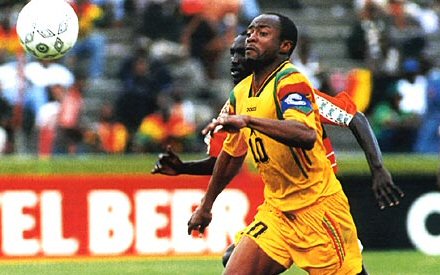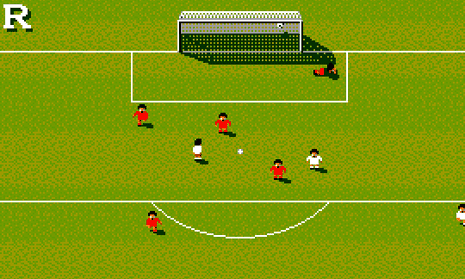
If you’re going to acquire the nickname ‘Pele’, you need to have a very special footballing gift (or hopeless predictive powers and an enthusiasm for Nicky Butt and viagra). Not only was Abedi ‘Pele’ Ayew a special talent, but his moniker – picked up as a child playing football in the street – remained with him through out his professional career. And he did it justice.
Ayew was a number 10 with breathtaking skills, who remains the greatest player that Ghana – and some would argue Africa – has produced. He is his nation’s most capped footballer and all-time top scorer, and holds the record for the most appearances in Cup of Nations finals, featuring in five since winning the tournament as a 17-year-old in 1982. Abedi played for a number of European clubs after pitching up at FC Zurich in 1983, but he would he would hit his peak in the early 90s as part of Marseilles’ ‘magic triangle’ with Chris Waddle and Jean Pierre Papin. Between 1991 and 1993, his boundless creativity and havoc-causing runs would help l’OM to two European Cup finals and his country to their first Cup of Nations final in a decade.
The 1992 Cup of Nations was Abedi Pele’s tournament. The Black Stars might have come up short in their quest for the trophy, but they were hauled to the final by their talisman, and there were no other contenders for the Golden Ball, so dominant were his performances from start to (almost) finish. It was he who set them on their way, getting the only goal of the game in their opening win against Zambia, while a late Tony Yeboah goal against Egypt sealed Ghana’s passage to the quarter finals.
It’s both sad and a testament to his enduring legacy that it’s far easier to find an Abedi Pele wonder goal scored by somebody on one of the FIFA games than it is to find the genuine article. For it was in the last eight in ’92 that Abedi scored one of the great AFCON goals. With Ghana and Congo level at 1-1, Pele picked up the ball in his own half around the hour mark and beat one player. Then another. Then another. Still on the charge, he waltzed between two more defenders before causally slotting the ball past the goalkeeper. It was a dazzling solo effort reminiscent of Maradona’s best, and would end the contest in the Black Stars’ favour. It is still talked about in hushed tones today.
In the semis against Nigeria, Abedi turned in perhaps his most inspirational performance yet, scoring again to cancel out Adepoju’s opener and exhausting the Super Eagles with his bottomless bag of tricks, the winner coming from Prince Polley. Abedi would not be joining his team mates in the final against Ivory Coast however – a second yellow card of the competition meant he would miss out through suspension. His absence rocked the Black Stars, who didn’t look anywhere near as assured without him. Côte D’Ivoire had got to the final largely by virtue of a formidable defence. Three of their four games en route had been goalless after 90 minutes, with Zambia beaten by a single goal in extra time in the quarters and Cameroon defeated on penalties in the following round. In the final they again looked to frustrate their opponents. Ghana were heavy favourites, but with no Abedi to unpick that sturdy Ivorian backline they too were held to a stalemate, precipitating a frankly interminable penalty shoot-out in which every outfield player on the pitch was required to participate. With the scores at 10-10, and only one player missing their spot kick on each side, defender Anthony Baffoe (a trailblazer in Ghanaian football as the first expatriate to play for the Black Stars) was called on to take his second penalty of the shoot-out. He’d scored his first, but this time he missed, handing Ivory Coast their first ever Cup of Nations.
In truth, that Ghana generation was a talented side and by no means a one-man team, but their status as African football’s nearly-men throughout the decade owed much to their inability to function as a unit. They were a collection of skilful yet fractious individuals and it seemed that dressing-room unrest prevented them from fulfilling their potential. There were long-standing rumours of a feud between Abedi and Yeboah (supposedly over the captaincy), that apparently raged long after both players had retired from international football and saw players and coaches alike take sides, with the team suffering as a result. Ayew however, has denied this.
Shrugging off Ghana’s defeat, Abedi went on to enjoy perhaps the finest season of his career in 1992-93 and was a pivotal figure as Marseilles won the inaugural Champions’ League. AC Milan had no answer to his charging runs, tricks and vision, and he scooped man of the match honours in the final, providing the corner from which Basile Boli headed the game’s only goal.That would mark the pinnacle of the Ghanaian’s career and it would be mainly downhill from there. The Bernard Tapie match-fixing scandal that would tarnish Marseilles’ finest hour led to a mass exodus of the club’s crown jewels that summer as the club were demoted as punishment. Abedi reportedly had a clause inserted into his contract by l’OM preventing him from directly joining an Italian club, which might explain why he headed to Lyon – then nothing like the juggernaut that would dominate Ligue Un during the following decade. The signing was seen as a real coup for l’OL, but the move soon soured. Abedi’s performances were way below par and he managed just three goals in 29 appearances. Lyon felt he was doing little more than killing time until he could jump to Serie A. For his part, Abedi claimed that the quality of training at Lyon was the worst he had experienced.
Ayew would get his move to Italy, enjoying a fruitful couple of years at Torino that included being voted Serie A’s top foreign player in 1995-96. At the end of his second season, now heading towards the twilight of his career at 31, he sought a new challenge in the Bundesliga with 1860 Munich. There, he helped to kick-start the club’s last real golden age alongside the likes of Daniel Borimirov and a young Jens Jeremies.
Throughout that time, Abedi continued to captain Ghana, featuring in three more AFCON tournaments. He scored three goals as the Black Stars finished fourth in 1996, and retired after the 1998 competition. At club level, he enjoyed a successful, lucrative swansong in the Gulf at UAE side Al-Ain, finally retiring aged 37 in 2000.
Between the Yeboah feud gossip, Marseilles’ downfall and the Lyon transfer imbroglio, controversy has never seemed far away from Abedi Pele, and it has followed him in retirement as well – not least when he was found guilty of match-fixing when the team he owns, Nania FC, won a second division Ghanaian league game by the rather suspicious scoreline of 31-0 in 2007. Though the resultant fine and ban was overturned on appeal, the whole affair has left a nasty taste in the mouth of Ghanaian football. Abedi nevertheless remains a living legend in the country and his talent appears to have been passed on to his sons, Andre and Jordan, who have followed in his footsteps to play for Marseilles. In particular, Andrè ‘Dèdè’ Ayew has inherited a number of Abedi’s dazzling trademarks – raw pace, power, deftness of touch – which have made him one of the hottest properties in world football. He also appears similarly headstrong off the pitch, as evidenced by clashes with national coach (and Abedi’s former team mate) James Kwesi Appiah that saw him omitted from Ghana’s 2013 Cup of Nations squad, despite being the team’s star performer.
21 years on from damaging defeat in Dakar, Ghana again found themselves among the favourites to claim the Cup of Nations, and once again, the absence of a talismanic Ayew and a penalty shoot out defeat to unfancied opposition have seen them leave the AFCON empty-handed. It’s 31 years since the teenage Abedi got his hands on the trophy. Are the Ayews – and the Black Stars – cursed never to lift it again?

Great piece Rob – myself and a pal – @fallum on twitter – were lucky to be at that European Cup Final in Munich and I wrote about it a couple of years ago: